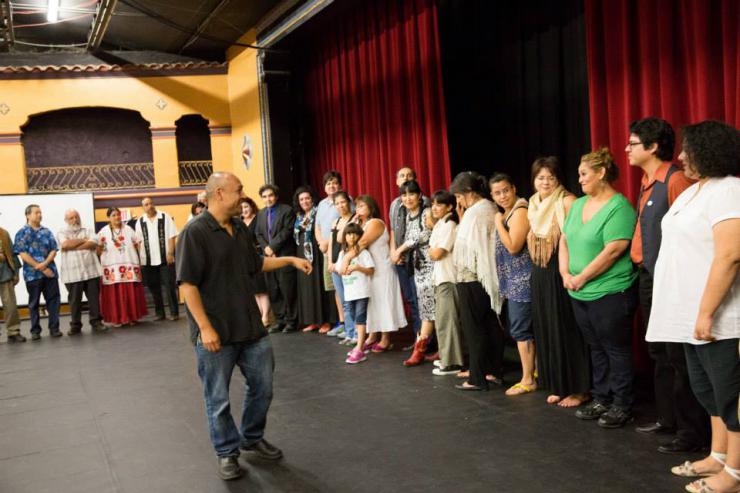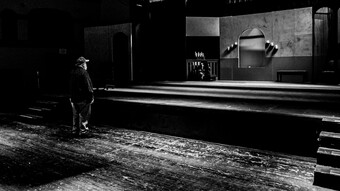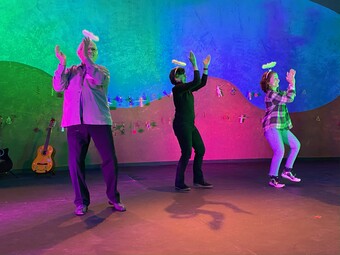Spotlight on the Regional Alliances
San Antonio Latino/a Theatre Alliance
This is the fourth post in a series of profiles of Latina/o regional alliances from around the country. Responses for this interview were provided by Marisela Barrera on behalf of SALTA.
San Antonio Latino/a Theatre Alliance was founded in April 2013 and serves San Antonio, Texas.
What’s your mission?
SALTA advocates for independent artists and theatre arts organizations and serves to cultivate, promote and present Latino/a theatre in San Antonio and South Texas.
How did your alliance form?
SALTA was born out of necessity. Contemporary teatro en San Antonio is not institutionalized. Consequently, San Anto teatristas have wagered livelihoods and resources over production. We lack representation in our city-funded nonprofit theaters. Our teatro has survived and thrived, however, through these painful-to-produce independent productions. Teatro en San Antonio often has a quick timeline, lacks a budget, and is devoid of infrastructure such as performance/production space and administrative support. SALTA was formed to help create and advocate for this infrastructure.
How is your alliance structured? Does one person lead, a team lead, etc.?
A group of five teatristas meet regularly as the SALTA action committee. Membership on the committee implies a commitment to advancing SALTA's mission through hands-on responsibilities. SALTA's structure is fluid; as such, action committee responsibilities adjust based on a member's time availability and interest in a particular project. SALTA is currently a 100 percent volunteer organization.
How does someone become a member? What membership requirements do you have, and where can people go to get more information?
There are presently no general membership requirements. We encourage members to support performances, readings, and workshops.
How big is your current membership:
No official count.
Who makes up your current membership?
The membership is made up of actors, writers, directors, educators, community activists, and arts advocates and supporters.
Who are the most well-represented groups in your membership from the list above?
Actors, playwrights, directors, and producers make up the majority of membership. Many in our membership hold multiple theater identities, the most frequent being “actor/writer/director/producer,” reflecting San Antonio's self-producing reality.
Describe your core programs/activities:
SALTA is composed of diverse theatre artists who work independently and with such organizations such as the Guadalupe Cultural Arts Center, Jump-Start Performance Co., Classic Theatre, AtticRep, and others. “World Theatre Day and Teatro Rasquachismo Celebration,” now entering its third year, is one of our signature events. In addition, SALTA hosts professional development workshops and events with visiting teatristas. In the past year, for example, we hosted three staged readings, a playwriting workshop (with Carlos Morton in collaboration with Northwest Vista College) and several community pláticas, one with Vicki Grise.

Since your alliance’s inception, what project have you completed that are you most proud of?
For the past two years, SALTA has produced “World Theatre Day and Teatro Rasquachismo Celebration,” placing ourselves part of a united world narrative of theatre makers while maintaining our micro-local and medio loco identity. SALTA partnered with Palo Alto College in year one to honor Dr. Tomas Ybarra-Frausto and the University of Texas at San Antonio this past year to honor Dr. Carmen Tafolla as recipients of the “Teatro Rasquachismo Award” during our World Theatre Day celebration. The annual event also features a performance festival featuring local writers and actors and attracts a cross-generational audience.
What plans does your alliance have for the future that might be of interest for the world to know?
SALTA's goal is to create a viable production infrastructure for the independent San Antonio Latino/a theatre artist by partnering with organizations with infrastructure (and money). We will continue advocating for San Antonio teatristas on the local, regional, and national level by maintaining relationships with the Latino/a Theatre Commons (on the national front), and supporting local writers through our staged reading series and professional development workshops (on the local front). Ultimately, we would like to develop a professional Latino/a theater for San Antonio.
What makes the needs of artists in your region different from other regions?
We have zero equity stages. We do not have a MFA training program in theater. (The nearest MFA theater program is about an hour away in San Marcos.) We do not have a theater company focused primarily on Latino/a works for the stage. (San Antonio's only professional theater paying theater artists a living wage is The Magik Theater, a children's theater focused primarily on the under 13 demographic.) We do not have enough scholars documenting our work. We do not document the work ourselves and do a poor job in developing a script that is ready to pitch or propose to theaters outside our region. In San Antonio, community theater means mainstream theater with limited budgets, focused primarily on musicals and white male writers. There are exemptions, of course, but we still see “token Hispanic” plays with no actual community audience development. Disciplined, professionally produced theater does exist, however, despite stiff economic factors. And our Latino community does surface if they find out teatro is happening. We are in need of time and resources to let our community know about teatro happenings. Because they will come.
What makes Latina/o theatre in your area special?
We are a Mexican-American city, deeply inspired by our cultural legacy of teatro and Chicano/a aesthetics. Our audience includes Chicano/a urban millennials to retired professionals from diverse cultural backgrounds. Academics, educators, activists, artists are our groupies. We have an infusion of what I call performative memoir written, performed, directed, and produced primarily by Chicanas. Our working artists make San Antonio teatro special: Jorge Pina, Anna De Luna, Jose Ruben De Leon, Maria Ibarra, Joel Settles, Selena Navarro, Adriana Garcia, Ruby Nelda Perez, Jesus Alonso, Gregg Barrios, Alison Vasquez, Monessa Esquivel, Smiley Riojas, Billy Munoz, Vicki Grise (we still claim her), Amalia Ortiz (we claim her, too), Janie Sauceda, Lisa Suarez, Nicolas Valdez, Jerry Ruiz (claimed), más, más, más teatristas telling our stories in theaters, parking lots, community centers, classrooms, and cantinas. Despite our production challenges, our teatro is plentiful and rooted with honesty and animo.











Comments
The article is just the start of the conversation—we want to know what you think about this subject, too! HowlRound is a space for knowledge-sharing, and we welcome spirited, thoughtful, and on-topic dialogue. Find our full comments policy here
Hi Emily, Let's collaborate! I am at [email protected].
@emilyaguilarthomas:disqus @marichingas:disqus At the least we (Houston, what what) should do a one day event and tie it in with a play going up at Teatro Vivo, Jump Start, lo que sea....no se pero hay muchas posibilidades!
SALTA and TIA (Teatro In Austin) should collaborate!